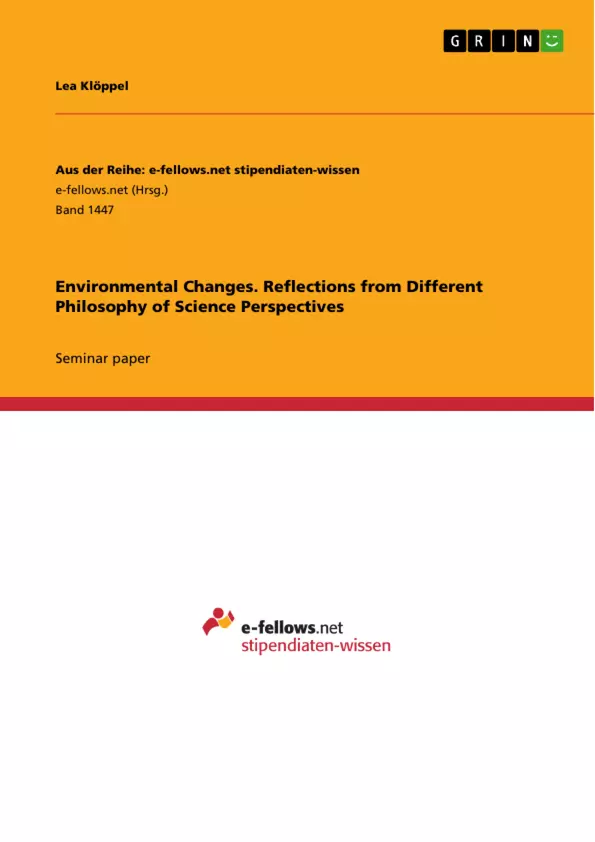In mainstream Western discourses, phenomena of environmental change such as climate change, loss of biodiversity or degradation of soils are often linguistically equated with value-laden terms such as 'environmental problems', or subsumed under titles such as 'environmental crisis'.
Whereas these phenomena are widely researched and discussed in terms of their nature, their causes, their severity and potential solutions, the underlying assumption of this research and these discussions, namely the assumption that these phenomena are actually problematic and need to be averted, seems rarely to be considered.
However, given the amount of research dedicated to phenomena of environmental change, it is crucial to investigate this assumption.
This paper will discuss how different philosophy of science perspectives would deal with the question in how far phenomena of environmental change (such as climate change, loss of biodiversity, degradation of soils) are actually problematic. The perspectives that will be adopted are positivism, critical realism, social constructivism and feminism.
The paper will be structured along the spectrum between realism and relativism on which positivism, critical realism and social constructivism can be located rather clearly.
However, since “[t]here is no single feminist standpoint”, 'feminism' as such can not be unitarily placed on this spectrum. Therefore, the feminist perspective will not be discussed in a separate section like the other perspectives, but will be taken up wherever it can enrich another perspective in its approach to the question. To provide an understanding of feminism, feminism will be shortly outlined before getting into the discussion of the question.
Inhaltsverzeichnis (Table of Contents)
- Introduction
- Main part
- Feminism
- Positivism
- Critical Realism
- Social Constructivism
- Conclusion
Zielsetzung und Themenschwerpunkte (Objectives and Key Themes)
This paper aims to explore how different philosophies of science approach the question of whether environmental changes, such as climate change, loss of biodiversity, and soil degradation, are inherently problematic. The paper examines the perspectives of positivism, critical realism, social constructivism, and feminism, analyzing their stances on the relationship between environmental change and societal problems.
- The Situatedness of Knowledge and Gendered Dualisms in Feminist Thought
- The Positivist Criterion of Observability and its Implications for Causality
- The Role of Critical Realism in Recognizing Underlying Structures and Mechanisms
- The Social Construction of Environmental Problems and the Importance of Context
- The Interplay of Different Philosophical Perspectives on Environmental Issues
Zusammenfassung der Kapitel (Chapter Summaries)
- Introduction: The paper introduces the concept of environmental change as a subject of debate, highlighting the assumption that these changes are inherently problematic and require intervention. It outlines the different philosophies of science that will be explored in the paper, particularly focusing on positivism, critical realism, social constructivism, and feminism.
- Feminism: This section provides an overview of feminist theory, emphasizing the concepts of situated knowledge and gendered dualisms. It discusses the evolution of feminist standpoint theory, acknowledging the limitations of essentialist perspectives and highlighting the importance of recognizing diverse standpoints. The section also explores the connection between feminism and ecofeminism, focusing on the expansion of feminist concerns to include the exploitation of nature.
- Positivism: This section delves into the origins and core tenets of positivism, emphasizing the scientific approach to knowledge based on observation, experimentation, and comparison. It highlights the positivist criterion of observability and its role in defining causality, emphasizing the concept of constant conjunction between observable phenomena. The section also addresses the logical problem of verification and the shift towards falsificationism as proposed by Karl Popper, introducing the concept of neopositivism.
- Positivism and the Research Question: This section examines the application of positivism to the research question of environmental change as a problem. It proposes that from a positivist perspective, environmental change is considered problematic when it can be empirically proven to cause societal problems through observable connections and a constant conjunction between the environmental change and negative societal phenomena. This approach considers the system to be closed, minimizing the impact of external factors.
Schlüsselwörter (Keywords)
The paper primarily focuses on the concept of environmental change, particularly climate change, loss of biodiversity, and soil degradation. It investigates how different philosophical perspectives, such as positivism, critical realism, social constructivism, and feminism, approach the question of whether these changes constitute problems. The paper explores key themes including the situatedness of knowledge, gendered dualisms, the criterion of observability, causality, and the social construction of problems.
Frequently Asked Questions
What is the main objective of this paper on environmental change?
The paper explores how different philosophies of science (positivism, critical realism, social constructivism, and feminism) approach the question of whether environmental changes are inherently problematic.
How does positivism define environmental problems?
From a positivist perspective, environmental change is considered a problem if it can be empirically proven to cause negative societal effects through observable connections and causality.
What is the role of feminism in this scientific discourse?
Feminism introduces the concepts of situated knowledge and gendered dualisms, questioning how traditional scientific views might overlook the exploitation of nature.
What does social constructivism contribute to the debate?
Social constructivism examines how environmental "problems" are socially constructed through language, context, and societal values rather than being objective facts.
Which environmental phenomena are specifically discussed?
The paper focuses on climate change, the loss of biodiversity, and the degradation of soils.
- Citation du texte
- Lea Klöppel (Auteur), 2015, Environmental Changes. Reflections from Different Philosophy of Science Perspectives, Munich, GRIN Verlag, https://www.grin.com/document/301394



